|
|
|
Sort Order |
|
|
|
Items / Page
|
|
|
|
|
|
|
| Srl | Item |
| 1 |
ID:
157785
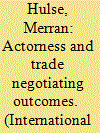

|
|
|
|
|
| Summary/Abstract |
In 2014, the EU concluded Economic Partnership Agreements (EPAs) with several African, Caribbean and Pacific (ACP) regions. These EPAs represent some of the most advanced examples of interregional cooperation. Yet, the outcomes of EPA negotiations are not the same across all regions. This article investigates differences in negotiated outcomes and argues that regional actorness – the ability of regions to become identifiable, to aggregate the interests of member states, to formulate collective goals and to make and implement decisions – influences regions’ ability to navigate interregional trade negotiations. In a comparison of the actorness and negotiated outcomes of West Africa and the SADC EPA Group, the article shows that actorness matters for international negotiations: regions with higher levels of actorness can negotiate better outcomes even under conditions of stark power asymmetry.
|
|
|
|
|
|
|
|
|
|
|
|
|
|
|
|
| 2 |
ID:
039411
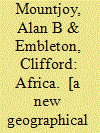

|
|
|
|
|
| Publication |
New York, Frederick A Praeger Publishers, 1967.
|
| Description |
688p.Pbk
|
|
|
|
|
|
|
|
|
|
|
|
Copies: C:1/I:0,R:0,Q:0
Circulation
| Accession# | Call# | Current Location | Status | Policy | Location |
| 008195 | 916.096/MOU 008195 | Main | On Shelf | General | |
|
|
|
|
| 3 |
ID:
045349
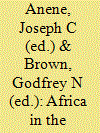

|
|
|
|
|
| Publication |
London, Ibadan University Press and Nelson, 1968.
|
| Description |
xvi, 555p.: plates, maps, figureshbk
|
|
|
|
|
|
|
|
|
|
|
|
Copies: C:1/I:0,R:0,Q:0
Circulation
| Accession# | Call# | Current Location | Status | Policy | Location |
| 003479 | 960.3/ANE 003479 | Main | On Shelf | General | |
|
|
|
|
| 4 |
ID:
140192
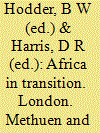

|
|
|
|
|
| Publication |
London, Methuen and co. ltd., 1967.
|
| Description |
x, 378p.:figureshbk
|
|
|
|
|
|
|
|
|
|
|
|
Copies: C:1/I:0,R:0,Q:0
Circulation
| Accession# | Call# | Current Location | Status | Policy | Location |
| 000535 | 916.04960/HOD 000535 | Main | On Shelf | General | |
|
|
|
|
| 5 |
ID:
183675
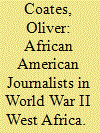

|
|
|
|
|
| Summary/Abstract |
The National Negro Publishers Association (NNPA) Commission to West Africa in 1944–1945 represents a major episode in the history of World War II Africa, as well as in American–West Africa relations. Three African American reporters toured the Gold Coast, Sierra Leone, Nigeria, Liberia, and the Congo between November 1944 and February 1945, before returning to Washington, DC to report to President Roosevelt. They documented their tour in the pages of the Baltimore Afro-American, the Chicago Defender, and the Norfolk Journal and Guide. Their Americans’ visit had a significant impact in wartime West Africa and was widely documented in the African press. This article examines the NNPA tour geographically, before analyzing American reporters’ interactions with West Africans, and assessing African responses to the tour. Drawing on both African American and West African newspapers, it situates the NNPA tour within the history of World War II West Africa, and in terms of African print culture. It argues that the NNPA tour became the focus of West African hopes for future political, economic, and intellectual relations with African Americans, while revealing how the NNPA reporters engaged African audiences during their tour.
|
|
|
|
|
|
|
|
|
|
|
|
|
|
|
|
| 6 |
ID:
131222
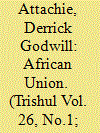

|
|
|
| 7 |
ID:
129194
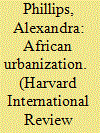

|
|
|
|
|
| Publication |
2014.
|
| Summary/Abstract |
Eko Atlantic is a city that rises "like Aphrodite from the foam of the Atlantic," wrote Nobel Prize winner Wole Soyinka. The city is defined by sustainability, luxury, technology, and economic opportunity. It is Africa's own Dubai; a gleaming gateway to the continent that will revolutionize the city of Lagos, solidifying its place as West Africa's financial center. The private development, which is located on land reclaimed from the Atlantic Ocean along
Lagos' upscale Bar Beach coastline, is predicted to house 400,000 residents and to provide over 150,000 jobs. Eko Atlantic is ushering in a wave of futuristic African cities. These modern satellite cities are built on the edge of existing metropolises in the hopes of transforming the country's economy and its role in the global marketplace. For example, developers are building Hope City outside Accra and Konza Techno City, known as "Africa's Silicon Savannah," outside Nairobi, in the hopes to turn Ghana and Kenya respectively into major players in the technology industry. African urbanization is occurring at a breakneck pace, and if done right, presents a valuable and unique opportunity to create jobs and lift millions out of poverty. However, if done wrong, the urban poor could become increasingly marginalized as slums are cleared to make way for housing they cannot afford and the mobile upper class migrates to upscale edge cities such as Eko Atlantic. Africa has the chance to urbanize in a way that increases the total populace's aggregate quality of life rather than deepening the divide between the tiny elite and the vast urban poor, but corruption and poor urban planning must first be overcome.
|
|
|
|
|
|
|
|
|
|
|
|
|
|
|
|
| 8 |
ID:
045523
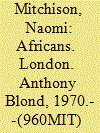

|
|
|
|
|
| Publication |
London, Anthony Blond, 1970.
|
| Description |
232p.hbk
|
|
|
|
|
|
|
|
|
|
|
|
Copies: C:1/I:0,R:0,Q:0
Circulation
| Accession# | Call# | Current Location | Status | Policy | Location |
| 005752 | 960/MIT 005752 | Main | On Shelf | General | |
|
|
|
|
| 9 |
ID:
122424
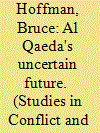

|
|
|
|
|
| Publication |
2013.
|
| Summary/Abstract |
This article considers the current state of the Al Qaeda terrorist movement and its likely future trajectory. It considers the principle assumptions both today and in the past about Al Qaeda and how they affect our understanding of the movement and the threat that it poses; Al Qaeda's current capacity for violence; and its ability to plan strategically and implement terrorist operations. The article further identifies nine key change drivers that will likely determine Al Qaeda's fate in the years to come before concluding that, even while the core Al Qaeda group may be in decline, Al Qaeda-ism, the movement's ideology, continues to resonate and attract new adherents. In sum, it argues that Al Qaeda remains an appealing brand most recently and most especially to extremist groups in North and West Africa and the Levant.
|
|
|
|
|
|
|
|
|
|
|
|
|
|
|
|
| 10 |
ID:
142540
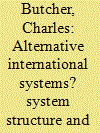

|
|
|
|
|
| Summary/Abstract |
Were precolonial state systems different to the European model? If so, how did these state systems vary, and do variations in system structure influence the frequency of war? In this article we assess the structure off international systems in nineteenth-century West Africa, Southeast Asia, and South Asia using new data on precolonial states that corrects for some of the biases in the existing Correlates of War state system membership data. We develop a framework to capture variation in political order above and below the state, and explore the similarities and differences between these systems and the European system we know and study. We then assess how rates of inter- and intra-state war varied across these systems. Our results suggest: (1) It is the nature of hierarchy (not so much anarchy) that varies across these systems; and (2) inter-state wars are more frequent, but less intense, in systems composed of decentralised states.
|
|
|
|
|
|
|
|
|
|
|
|
|
|
|
|
| 11 |
ID:
068269
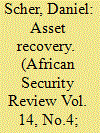

|
|
|
| 12 |
ID:
050854
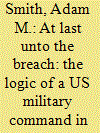

|
|
|
| 13 |
ID:
191730
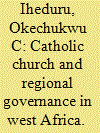

|
|
|
|
|
| Summary/Abstract |
‘Catholic regionalism’ in west Africa exemplifies the capacity of theological claims and theologically informed actors to influence regional governance and international affairs. It is driven by four mutually reinforcing factors: interfaith competition for policy influence and followership, shrinking domestic political space for civil society organizations (CSOs), and de-secularization/counter-secularization pressures (all of which have substantially diminished the church's erstwhile influence); as well as Economic Community of West African States (ECOWAS) reforms granting ‘access’ to CSOs in regional policy. Through a strategy of ‘fateful compromise’ with regional states, the church has, more than its counterparts, developed substantial capacity to influence how regional integration organizations frame and implement policy in Africa. The empirical evidence is derived from fieldwork interviews on the activities of church leaders, namely the bishops represented by the Regional Catholic Episcopal Conference of West Africa (RECOWA); the Catholic bishops’ conferences in Ghana and Nigeria, where interfaith hegemonic competition is most intense; and ECOWAS Commission bureaucrats. The article enriches the ‘new regionalism’ framework with a template to better understand the regional governance activities of Africa's faith-based actors; and contributes to the literature by introducing the concept of ‘fateful compromise’ suggesting multiple trajectories in church-state relations, contrary to the presumption of inevitable ‘elite cooptation’ of social forces as the only option for inclusive or collaborative governance in societies experiencing regression in democracy.
|
|
|
|
|
|
|
|
|
|
|
|
|
|
|
|
| 14 |
ID:
080719
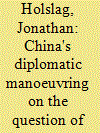

|
|
|
|
|
| Publication |
2008.
|
| Summary/Abstract |
This article assesses China's response to the violence in Darfur. Whereas the People's Republic had already been taking a constructive stance towards international interventions in various intra-state conflicts, the mayhem in Darfur compelled China to take the lead in engaging Khartoum. Beijing's engagement evolved from a rather passive posture, to taking a clear position, and finally, to active persuasion and mediation. During these negotiations, Beijing departed from the interests of the local political elite and tried to meet its concerns, not by imposing measures, but by clarifying the different options and creating trust to find a feasible consensus. From the Chinese perspective this approach was highly successful as it increased its moral influence, reassured its partners in Africa and the West, safeguarded its oil empire in Sudan and upheld its prerequisite of sovereignty and state consent
|
|
|
|
|
|
|
|
|
|
|
|
|
|
|
|
| 15 |
ID:
186531
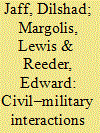

|
|
|
|
|
| Summary/Abstract |
Humanitarian agencies and military forces are increasingly interacting on the ground during humanitarian crises. These evolving relationships are often complicated and bring forward many implementation challenges. This paper repurposes this debate by describing three non-conflict humanitarian case studies and using them to reflect on the problematic history and applicability of formal frameworks and guidelines. Recommendations to improve the structures and processes for implementation of relief strategies are offered. If the delivery of humanitarian assistance during non-conflict humanitarian crises is to be efficient, civil–military interactions should receive greater systematic attention.
|
|
|
|
|
|
|
|
|
|
|
|
|
|
|
|
| 16 |
ID:
086088
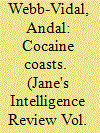

|
|
|
| 17 |
ID:
109637
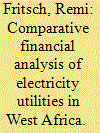

|
|
|
|
|
| Publication |
2011.
|
| Summary/Abstract |
Access to electricity is a major issue in West Africa. Governments have a difficult equation to solve. They naturally seek to offer their people a cheap kWh. But they are constrained by a production based largely on oil and therefore highly volatile production costs. How to fix an acceptable tariff, taking into account the investment needs required to expand the network and increase production? This analysis should provide some answers.
The study presented in this paper provides a financial analysis of electricity utilities in West Africa. It allows a comparison of performances on a number of key financial ratios related to operations (Earning Before Interest Taxes Debt and Amortization/sales, working capital requirement/sales, days of receivables or payables), investment (net fixed assets/gross fixed assets), bank financing (financial structure, debt/EBITDA, interest expense/EBITDA) and economic and financial returns (Return On Capital Employed, Return On Equity).
The conclusion focuses on the growth opportunity that the electricity sector could represent for each country. But this opportunity may only materialize if the EBITDA margins are restored. The available options appear limited and must be assessed taking into account the context of each country: tariff increase, improvement of technical losses or diversification into means of production no longer based primarily on oil or gas.
|
|
|
|
|
|
|
|
|
|
|
|
|
|
|
|
| 18 |
ID:
164637
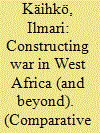

|
|
|
|
|
| Summary/Abstract |
This article investigates the variation of the conduct of war in three Mano River countries in West Africa – Côte d’Ivoire, Liberia and Sierra Leone. A theoretical framework that views war as an institution is provided to explain this variation. While an existing idea in social sciences, to date it has largely been used to understand historical case. This article extends its scope to encompass non-state actors and the modern era through an account of how war was constructed in the Mano River region. The idea of war as an institution highlights the value of cultural sociological investigations of war. As institutions structure action, the framework offered carries immediate consequences for strategic thought.
|
|
|
|
|
|
|
|
|
|
|
|
|
|
|
|
| 19 |
ID:
190361
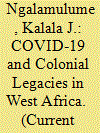

|
|
|
|
|
| Summary/Abstract |
The COVID-19 pandemic response in West Africa has been shadowed by the legacies of colonial-era approaches to disease control.
|
|
|
|
|
|
|
|
|
|
|
|
|
|
|
|
| 20 |
ID:
144241
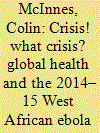

|
|
|
|
|
| Summary/Abstract |
This article examines why the 2014–15 outbreak of Ebola in West Africa, which subsequently spread more widely, was understood as a crisis. It begins from the basis that there was nothing ‘natural’ about it being considered a crisis; rather it was socially constructed as such. Specifically it suggests that the outbreak could be understood as a crisis because of the way in which it resonated with the global health narrative. The article examines how the elements which constitute this narrative – the effects of globalisation, the emergence of new risks and the requirement for new political responses – are fundamental to how Ebola was understood as a crisis.
|
|
|
|
|
|
|
|
|
|
|
|
|
|
|
|
|
|
|
|
|